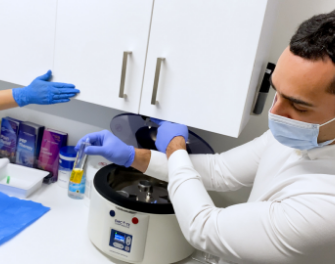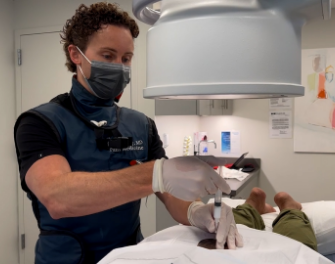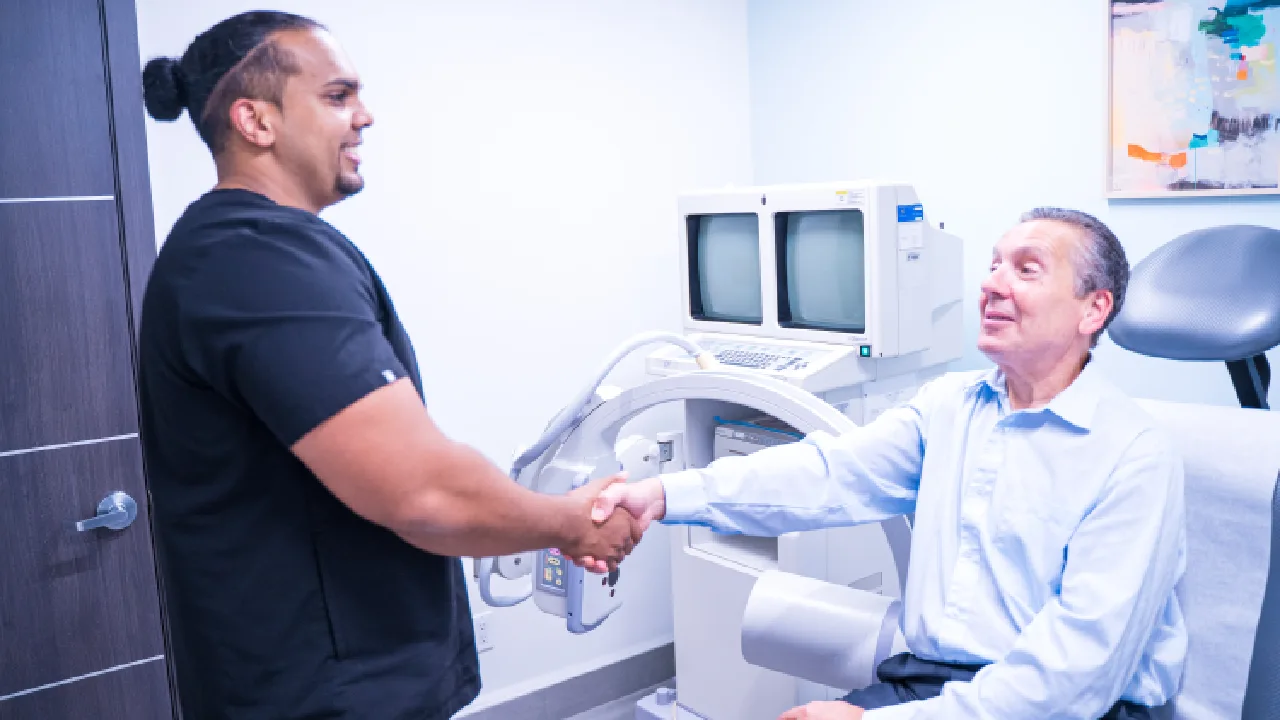
Diagnosing Chronic Pain: Physical Examination, Imaging Tests, Diagnostic Injections, and More…
At Pain Treatment Specialists, we understand the debilitating impact chronic pain can have on your daily life. Whether it’s persistent back pain, migraines, or neuropathic discomfort, identifying the root cause is crucial for effective treatment. In this guide, we’ll explore various diagnostic methods used by our board-certified interventional pain specialists to accurately diagnose chronic pain and tailor personalized treatment plans just for you.
Are you interested in get more information about your condition or get a treatment?
Fill the form below to start!
Medical History and Physical Examination
One of the initial steps in diagnosing chronic pain is taking a thorough medical history and conducting a comprehensive physical examination. Our specialists will inquire about your symptoms, their onset, duration, aggravating factors, and any previous treatments or surgeries. Understanding your medical history helps us identify potential underlying conditions or risk factors. Our board-certified pain specialists may ask the following questions:
- When did your pain begin, and what were the circumstances surrounding its onset?
- Can you describe the nature of your pain (e.g., sharp, dull, burning, stabbing)?
- Where is your pain located, and does it radiate to other areas of your body?
- What exacerbates or alleviates your pain (e.g., movement, rest, specific activities)?
- On a scale of 0 to 10, how would you rate the intensity of your pain at its worst and best?
- Have you noticed any specific triggers or patterns associated with your pain episodes?
- How does your pain impact your daily activities, work, and quality of life?
- Have you tried any treatments or medications for your pain, and if so, what were the results?
- Do you have any medical conditions or previous injuries that may be relevant to your pain?
- Are there any familial or genetic factors related to pain in your family history?
During the physical examination, our specialists meticulously assess your range of motion, muscle strength, reflexes, and any signs of inflammation or injury. By conducting a thorough examination, we gain valuable insights into the underlying causes of your pain and tailor our diagnostic approach accordingly. During the physical examination, you can expect:
- Evaluation of your range of motion in affected joints or regions
- Assessment of muscle strength and any signs of weakness or atrophy
- Testing of reflexes to gauge nervous system function
- Palpation of tender points or areas of inflammation
- Observation of posture and gait to identify abnormalities
- Discussion of any previous injuries or surgical scars relevant to your pain
- Explanation of each step of the examination to ensure your comfort
Imaging Studies
Imaging studies play a vital role in diagnosing chronic pain by providing detailed anatomical information and identifying structural abnormalities. At Pain Treatment Specialists, we utilize state-of-the-art imaging techniques such as:
- X-rays: X-rays are often the first-line imaging modality used to evaluate bone structures and detect fractures, arthritis, or degenerative changes in the spine or joints.
- MRI (Magnetic Resonance Imaging): MRI offers superior soft tissue visualization, making it ideal for assessing spinal discs, nerves, muscles, and ligaments. It helps identify herniated discs, spinal stenosis, tumors, and other soft tissue pathologies.
- CT (Computed Tomography): CT scans provide detailed cross-sectional images of bones and soft tissues, making them valuable for detecting fractures and bone abnormalities and assessing complex spinal conditions.
Electrophysiological Testing
Electrophysiological tests evaluate the function of nerves and muscles, aiding in the diagnosis of neuropathic pain and nerve-related disorders. Common electrophysiological tests include:
- Nerve Conduction Studies (NCS): NCS measures the speed and strength of electrical signals traveling along peripheral nerves, helping diagnose conditions such as carpal tunnel syndrome, diabetic neuropathy, and radiculopathy.
- Electromyography (EMG): EMG assesses the electrical activity of muscles and the corresponding nerve supply. It aids in diagnosing muscle disorders, peripheral nerve injuries, and conditions like myasthenia gravis.
Diagnostic Injections
Diagnostic injections, also known as nerve blocks or local anesthetic injections, help pinpoint the exact source of pain by temporarily numbing specific nerves or joints. These injections serve both diagnostic and therapeutic purposes:
- Facet Joint Injections: Facet joints are small joints located between vertebrae in the spine. Facet joint injections involve injecting a combination of local anesthetic and anti-inflammatory medication into these joints to alleviate pain and confirm facet joint involvement in spinal pain.
- Epidural Steroid Injections: Epidural injections deliver corticosteroids into the epidural space surrounding the spinal cord and nerve roots. They reduce inflammation and alleviate pain associated with conditions such as herniated discs, spinal stenosis, and sciatica.
- Peripheral Nerve Blocks: Peripheral nerve blocks target specific nerves responsible for transmitting pain signals. These can provide diagnostic information and offer temporary relief from conditions like occipital neuralgia, intercostal neuralgia, and trigeminal neuralgia.
Laboratory Tests
Laboratory tests may be ordered to assess inflammatory markers, autoimmune factors, metabolic abnormalities, or underlying systemic conditions contributing to chronic pain. Common laboratory tests include:
- Complete Blood Count (CBC): CBC helps evaluate red blood cells, white blood cells, and platelets, providing insights into potential infections, anemia, or inflammatory conditions.
- Inflammatory Markers: Tests such as C-reactive protein (CRP) and erythrocyte sedimentation rate (ESR) measure inflammation levels in the body, aiding in the diagnosis of conditions like rheumatoid arthritis, lupus, or inflammatory bowel disease.
- Metabolic Panels: Comprehensive metabolic panels assess kidney function, liver function, electrolyte levels, and blood glucose levels, identifying metabolic imbalances or organ dysfunction that may contribute to pain.
What Happens After Diagnosis
Once a diagnosis is reached, our team at Pain Treatment Specialists collaborates with you to develop a comprehensive and personalized treatment plan tailored to address your specific needs and goals. This may include a combination of minimally invasive procedures, medication management, physical therapy, and lifestyle modifications aimed at reducing pain, improving function, and enhancing your overall quality of life.
FAQs
How long does the diagnostic process typically take?
The duration of the diagnostic process varies depending on the complexity of your symptoms, the need for additional tests or consultations, and the responsiveness to initial treatments. In some cases, a diagnosis may be reached after the initial evaluation and physical examination. However, for more complex conditions, it may take several appointments and investigative procedures to pinpoint the exact cause of your pain accurately.
What should I bring to my appointment for chronic pain evaluation?
It’s helpful to bring any relevant medical records, imaging reports, and a list of medications you’re currently taking. Be prepared to discuss your medical history, including previous injuries, surgeries, and treatments for pain. Additionally, keep track of your symptoms, including their onset, duration, intensity, and any factors that worsen or alleviate them. Providing comprehensive information ensures our specialists have a thorough understanding of your condition, facilitating an accurate diagnosis and tailored treatment plan.
Will I need to undergo invasive procedures for diagnosis?
Invasive procedures such as diagnostic injections or nerve blocks may be recommended in certain cases to confirm the source of your pain. These are minimally invasive and performed under fluoroscopic guidance. While they involve a small degree of discomfort, they provide valuable diagnostic information and may offer temporary relief from pain.
What if my diagnostic tests come back normal?
Even if initial diagnostic tests yield normal results, it’s essential to continue investigating and exploring other potential causes of your pain. Chronic pain can be multifactorial, and underlying conditions may not always be evident on routine tests. Our specialists employ a comprehensive approach, including thorough physical examinations, imaging studies, and specialized tests, to uncover hidden sources of pain and tailor an appropriate treatment plan.
Can chronic pain be cured, or is it managed long-term?
While some chronic pain conditions may be cured with appropriate treatment, such as addressing the underlying cause, many are managed long-term with a combination of therapies aimed at reducing pain and improving function. We aim to provide holistic care that addresses the physical and emotional aspects of chronic pain, empowering you to lead a fulfilling life despite ongoing symptoms.
Consult Pain Treatment Specialists to Identify the Root Cause of Chronic Pain
Diagnosing chronic pain requires a multifaceted approach that integrates clinical evaluation, imaging studies, electrophysiological testing, diagnostic injections, and more. At Pain Treatment Specialists, we are committed to employing advanced diagnostic techniques and personalized care plans to identify the underlying causes of your pain and provide targeted interventions for lasting relief. Don’t let chronic pain control your life – schedule a consultation with us today and take the first step towards reclaiming your health and well-being.
FEATURED POSTS BY PAIN DOCTORS



















